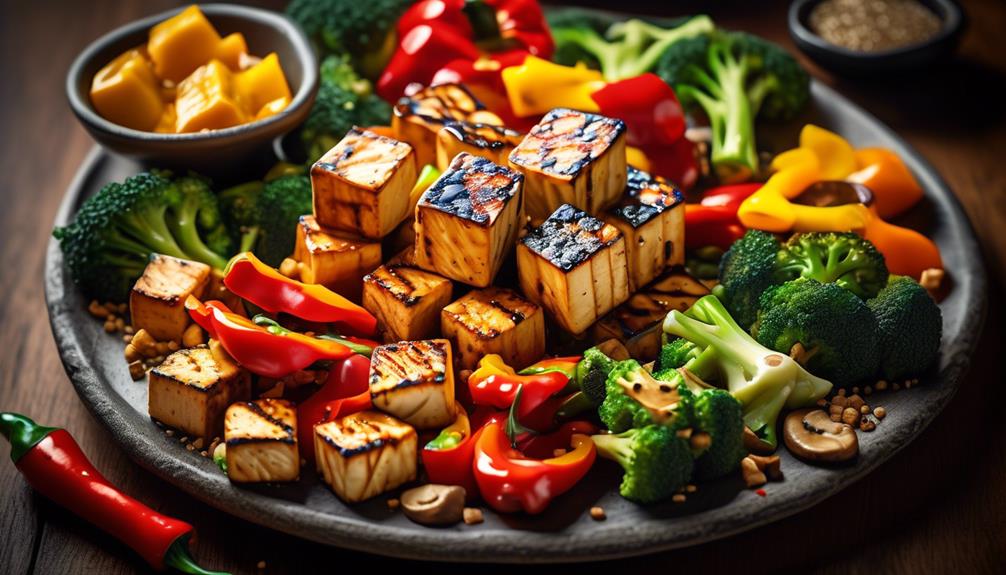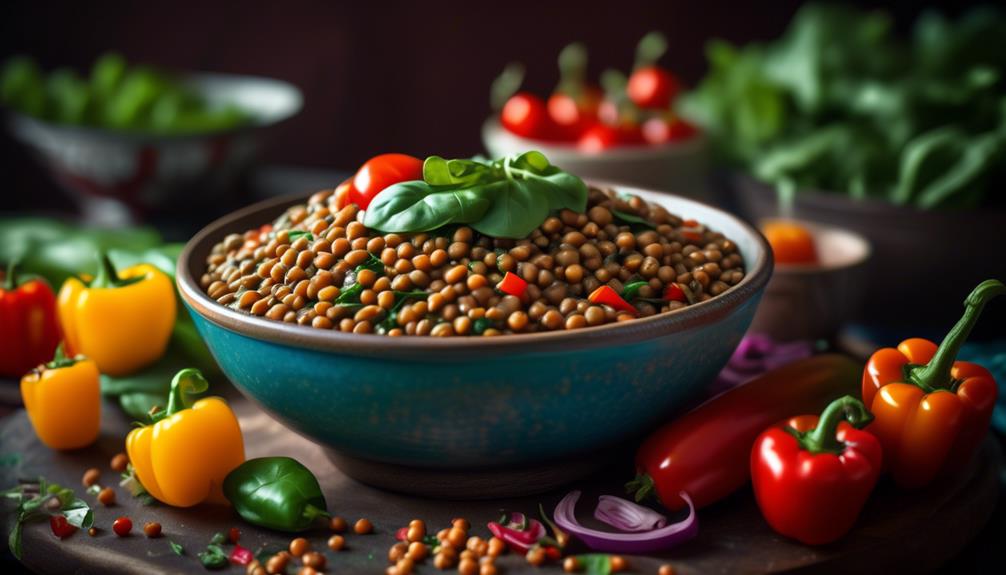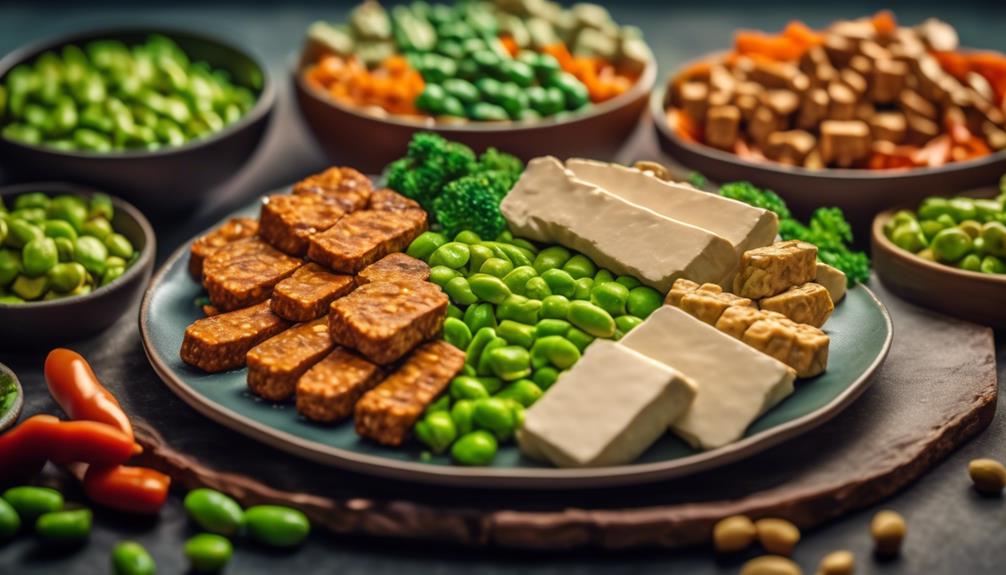Are you tired of the same old protein sources on your vegetarian keto diet? Well, fear not, because there are plenty of plant-based alternatives that can provide you with the protein you need.
These substitutes are not only delicious, but they also offer a variety of health benefits.
So, if you're ready to take your vegetarian keto journey to the next level, keep reading to discover the top plant-based protein substitutes that will leave you feeling satisfied and nourished.
Tofu

Tofu is a versatile and nutritious plant-based protein substitute commonly used in vegetarian keto diets. Incorporating tofu into your meal plan can offer various benefits for those following a vegetarian keto lifestyle.
Firstly, tofu is low in carbs and high in protein, making it an ideal food for maintaining ketosis. It contains all the essential amino acids, making it a complete source of protein. Additionally, tofu is rich in vitamins and minerals such as calcium, iron, and magnesium, which are essential for overall health.
When it comes to easy tofu recipes for a plant-based keto meal plan, there are plenty of options to choose from. One popular recipe is tofu stir-fry with low-carb vegetables like broccoli, bell peppers, and zucchini. You can also marinate tofu in a flavorful sauce and grill it to create delicious tofu skewers. Another option is to scramble tofu with spices and vegetables, creating a tasty and satisfying breakfast.
Incorporating tofu into your vegetarian keto diet offers numerous benefits. Its versatility and nutrient profile make it an excellent choice for those seeking to meet their protein needs while following a plant-based keto lifestyle. With its abundance of easy and delicious recipes, tofu can be a valuable addition to your meal plan.
Tempeh
Tempeh, another popular plant-based protein substitute, offers a range of nutritional benefits for those following a vegetarian keto lifestyle. Tempeh is made from fermented soybeans, which increases its digestibility and nutrient absorption. It's rich in protein, providing about 15 grams per 3-ounce serving, making it an excellent choice for meeting your protein needs on a vegetarian keto diet.
One of the benefits of tempeh in a vegetarian keto diet is its low carbohydrate content. With only about 4 grams of net carbs per serving, tempeh can easily fit into your daily carb limit. Additionally, tempeh is a good source of healthy fats, including omega-3 fatty acids, which are essential for brain health and reducing inflammation.
Incorporating tempeh into your keto meal plan is simple. You can marinate and grill it, sauté it with low-carb vegetables, or crumble it and use it as a meat substitute in dishes like stir-fries or salads. Tempeh can also be sliced and baked to create a crispy texture, ideal for adding to salads or as a topping for keto-friendly pizzas.
Seitan

Seitan is a plant-based protein substitute that boasts a high protein content, making it an excellent choice for those following a vegetarian keto diet. With approximately 20 grams of protein per 3.5 ounces, seitan can help meet your daily protein needs.
Additionally, seitan is incredibly versatile and can be used as a meat substitute in various dishes, providing a satisfying texture and flavor.
Seitan: High Protein Content
With its high protein content, seitan is a versatile plant-based protein substitute that can be incorporated into a vegetarian keto diet. Seitan, also known as wheat meat or wheat gluten, is made from gluten, the protein found in wheat. It's a popular choice for those following a vegetarian or vegan diet due to its meat-like texture and taste.
Seitan isn't only high in protein but also low in carbohydrates, making it suitable for a keto diet. It can be used in a variety of seitan recipes, such as stir-fries, sandwiches, and stews. In addition to its protein content, seitan also provides essential nutrients like iron and selenium.
Nonetheless, it's important to note that seitan isn't suitable for individuals with celiac disease or gluten intolerance.
Seitan: Versatile Meat Substitute
To continue exploring the benefits of incorporating seitan into your vegetarian keto diet, consider its versatility as a meat substitute. Seitan, also known as wheat meat or wheat gluten, is made from gluten, the protein found in wheat. It has a chewy texture and absorbs flavors well, making it an excellent substitute for meat in various dishes.
Seitan is a great option for vegetarians looking to increase their protein intake, as it contains about 25 grams of protein per 3.5 ounces.
When it comes to cooking seitan, the possibilities are endless. You can grill, sauté, or bake it, and it can be used in stir-fries, stews, sandwiches, and even as a pizza topping. Experiment with different seasonings and sauces to create delicious and satisfying meals.
Edamame
Edamame, a popular plant-based protein substitute, offers a nutritious and delicious option for those following a vegetarian keto diet. Here are the benefits of incorporating edamame into your meal plan:
- High in Protein: Edamame is packed with protein, making it an excellent choice for vegetarians looking to meet their protein needs on a keto diet. With approximately 17 grams of protein per cup, edamame helps support muscle growth and repair.
- Low in Carbs: One of the challenges of a vegetarian keto diet is finding protein sources that are low in carbs. Edamame fits the bill, as it contains only 8 grams of net carbs per cup. This makes it a suitable choice for those following a low-carb eating plan.
- Fiber-Rich: Edamame is also a great source of dietary fiber, with around 8 grams per cup. Fiber aids in digestion and helps you feel full, which can be beneficial for weight management on a keto diet.
To incorporate edamame into your vegetarian keto meal plan, consider adding it to salads, stir-fries, or even enjoying it as a standalone snack. You can also blend edamame into a creamy dip or use it as a topping for soups and stews. With its versatility and nutritional benefits, edamame is a valuable addition to any vegetarian keto diet.
Lentils

Lentils, a versatile legume, are a valuable addition to a vegetarian keto diet due to their high protein content and low carb count. With around 18 grams of protein per cooked cup, lentils are an excellent plant-based protein source for those following a vegetarian keto lifestyle. They're also low in carbohydrates, making them suitable for maintaining ketosis. Lentils aren't only nutritious but also easy to incorporate into various dishes.
There are numerous lentil recipes that can be enjoyed on a vegetarian keto diet. From lentil soups and stews to salads and curries, the possibilities are endless. Lentils can also be used as a substitute for meat in dishes like lentil burgers or lentil meatballs, providing a satisfying and flavorful alternative.
Aside from their protein content, lentils offer several nutritional benefits. They're a good source of fiber, which aids in digestion and helps maintain a healthy weight. Lentils are also rich in iron, folate, and other essential vitamins and minerals. Incorporating lentils into your vegetarian keto diet can provide you with a well-rounded nutrient profile and contribute to overall health and wellness.
Chickpeas
Chickpeas, also known as garbanzo beans, are a versatile and nutritious plant-based protein source that can be enjoyed on a vegetarian keto diet. Here are three reasons why you should consider incorporating chickpeas into your meals:
- Rich in Protein:
Chickpeas are packed with protein, making them an excellent choice for those following a vegetarian keto diet. Just one cup of cooked chickpeas provides around 15 grams of protein, helping you meet your daily protein needs.
- Fiber Powerhouse:
Chickpeas are high in dietary fiber, which is essential for maintaining a healthy digestive system and promoting feelings of fullness. This can be especially beneficial when following a keto diet, as it helps control appetite and manage weight.
- Versatile and Delicious:
Chickpeas can be used in a variety of recipes to add flavor, texture, and nutritional value. From salads and soups to homemade hummus and crispy roasted chickpeas, the possibilities are endless. Plus, they can be easily seasoned with herbs and spices to suit your taste preferences.
Incorporating chickpeas into your vegetarian keto diet not only provides a good source of plant-based protein but also offers numerous health benefits. So, why not try out some delicious chickpea recipes and reap the rewards for your overall well-being?
Hemp Seeds

If you're looking to diversify your plant-based protein options on a vegetarian keto diet, consider incorporating hemp seeds into your meals. Hemp seeds are a great source of plant-based protein, making them an excellent addition to your diet. These small seeds are packed with essential amino acids, which are the building blocks of protein. In fact, hemp seeds are considered a complete protein, meaning they contain all nine essential amino acids that your body needs.
One of the benefits of hemp seeds is their versatility. You can easily incorporate them into your meals by adding them to smoothies, sprinkling them on top of salads or yogurt, or using them in baked goods. They've a nutty flavor that adds a delicious taste to your dishes.
In addition to being a good source of protein, hemp seeds also provide a range of other nutrients. They're rich in healthy fats, including omega-3 and omega-6 fatty acids, which are important for brain health and reducing inflammation in the body. Hemp seeds are also high in fiber, which can help keep you feeling full and satisfied.
To make the most of hemp seeds in your vegetarian keto diet, try out some delicious hemp seed recipes. You can make hemp seed energy balls, hemp seed granola bars, or even hemp seed pesto. These recipes won't only provide you with a good amount of protein but also offer a tasty and nutritious way to incorporate hemp seeds into your meals.
Chia Seeds
Chia seeds are a versatile and nutritious plant-based protein substitute that can easily be incorporated into your vegetarian keto diet. Here's how to incorporate chia seeds into a keto diet and the benefits they offer for vegetarians on a keto diet:
- Chia seed pudding: Make a delicious and filling chia seed pudding by soaking chia seeds in your choice of plant-based milk or water. Add some low-carb sweeteners like stevia or monk fruit to taste, and let it sit in the fridge overnight. It's a great option for a keto-friendly breakfast or snack.
- Chia seed smoothies: Boost the protein content of your keto smoothies by adding chia seeds. Simply blend your favorite low-carb fruits and vegetables with a tablespoon or two of chia seeds for an extra nutrient boost.
- Chia seed toppings: Sprinkle chia seeds on top of your salads, soups, or roasted vegetables to add a crunchy texture and boost the protein content. They can also be used as a topping for keto-friendly desserts like cheesecakes or muffins.
Benefits of chia seeds for vegetarians on a keto diet include their high protein content, which helps meet the increased protein needs of a vegetarian keto diet. Chia seeds are also rich in fiber, healthy fats, and minerals like calcium and magnesium. Additionally, chia seeds are low in carbs, making them a suitable option for those following a keto diet.
Nutritional Yeast

To continue exploring plant-based protein substitutes for your vegetarian keto diet, let's now turn our attention to nutritional yeast.
Nutritional yeast is a deactivated yeast that's often used as a cheese substitute in vegan and vegetarian dishes. Despite its name, nutritional yeast isn't a source of Vitamin B12 unless it's fortified. However, it does offer several other health benefits.
One of the main benefits of nutritional yeast is its high protein content. Just two tablespoons of nutritional yeast provide around 9 grams of protein, making it a great addition to your vegetarian keto diet. It's also a complete protein, meaning it contains all nine essential amino acids that your body needs.
In addition to being a good source of protein, nutritional yeast is also rich in vitamins and minerals. It's a great source of B vitamins, including thiamine, riboflavin, and niacin. These vitamins play a crucial role in energy production and brain function. Nutritional yeast also contains minerals such as zinc, selenium, and magnesium.
When it comes to incorporating nutritional yeast into your vegetarian keto diet, the possibilities are endless. You can sprinkle it on top of salads, mix it into soups and stews, or use it as a seasoning for roasted vegetables. It can also be used to make a dairy-free cheese sauce or to add a cheesy flavor to vegan mac and cheese. Get creative and experiment with different nutritional yeast recipes to find your favorite way to enjoy this versatile ingredient.
Conclusion
In conclusion, these plant-based protein substitutes are excellent options for vegetarians following a keto diet. Tofu, tempeh, seitan, edamame, lentils, chickpeas, hemp seeds, chia seeds, and nutritional yeast are all rich in protein and can be easily incorporated into various keto-friendly recipes.
They're like the building blocks of a vegetarian keto diet, providing necessary nutrients and supporting muscle growth and repair, just like a strong foundation supports a sturdy house.







